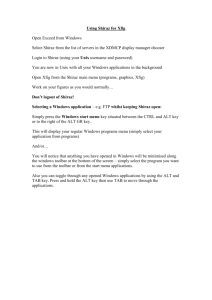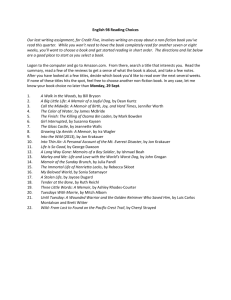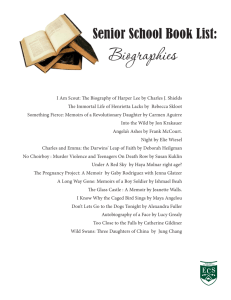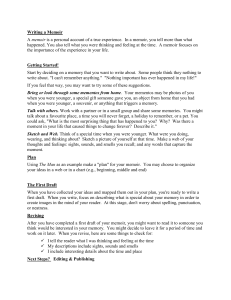Encouraging student collaboration, negotiation, and engagement in
advertisement
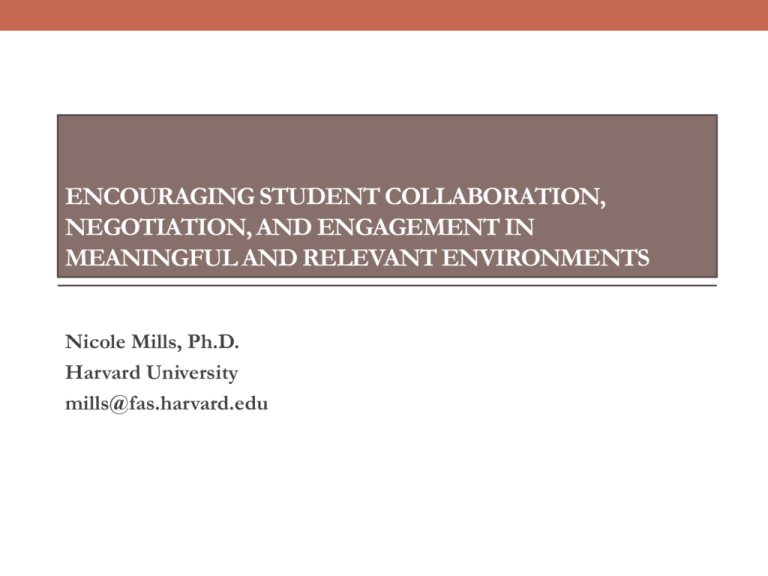
ENCOURAGING STUDENT COLLABORATION, NEGOTIATION, AND ENGAGEMENT IN MEANINGFUL AND RELEVANT ENVIRONMENTS Nicole Mills, Ph.D. Harvard University mills@fas.harvard.edu Overview of Presentation • Our students today: “Net-geners” • Constructivist Learning • Experiential Learning • Traditional vs. Experiential Learning models • Social turn in second language acquisition • Implications of Situated Learning Theory • Global Simulation Curriculum Format • Overview: Beginning French II Global Simulation Curriculum. Paris, France. • Proposal and Exchange: Global Simulation Curriculum in Shiraz, Iran • Course Themes & Grammar objectives • Interactive Memoir assignments • Oral Exam topics • Student-centered in-class activities • Final play • Constructivist and Experiential learning revisited Net-geners or Generation Z • Birthdates in the 1990s and 2000s • Increased use and familiarity with communications, media, and digital technologies • Highly participative. • Participate frequently in online interaction, collaboration, and exchange • Grown up within social communities (Facebook, etc.) and therefore thrive in collaborative and creative learning environments (Larry Rosen) The “Net-Geners” • Net-geners tend toward independence and autonomy in their learning styles, which impacts a broad range of educational choices and behaviors, from “what kind of education they buy” to “what, where, and how they learn” (Carlson, 2005) • This more independent learning style has grown out of the ingrained habits of seeking and retrieving information from the Internet, which marks a striking contrast to previous generations of students, who tended to acquire information more passively from authority figures (Tapscott, 1998) CONSTRUCTIVIST LEARNING How can we effectively engage our students, the “Net-Geners,” in the foreign language classroom? Characteristics of Constructivist Learning • Learner-centered • Embedded learning in complex, realistic and relevant environments. • Provide for social negotiation as an integral part of learning • Encourage ownership and self-direction in learning • Provide adequate time for learners’ investigation and in-depth engagement. • Action oriented where language is learned through collaboration and creativity -Dewey, Kolb, Vygotsky (Driscoll, 2000) EXPERIENTIAL LEARNING How do we provide opportunities for students to experience real, meaningful tasks and experience using the language in the classroom? How can we connect foreign language learning with life? Characteristics of Experiential Learning • Learners are active, responsible participants – not passive responders • Students are proactive rather than reactive • Creating motivating and engaging contexts for learning • Promote self-directed learning, autonomy, and choice in the learning process • Create opportunity for imaginative and inventive thinking • Develop learners’ social and interpersonal skills • Provide opportunities for collaborative and cooperative work • Encourage authentic language use which involves the learner • Bring learner in touch with real-life language use, involving a meaningful reason for doing different tasks (why are they reading the text? Why are they listening?) - David Nunan, Collaborative Language Learning and Teaching WHAT ARE THE DIFFERENCES BETWEEN TRADITIONAL AND EXPERIENTIAL LEARNING? Traditional vs. Experiential Learning View of learning Traditional Experiential Transmission of knowledge Transformation and use of knowledge Power relation Emphasis on teacher authority Teacher as a learner among learners Teacher’s role Providing mainly frontal instruction Facilitating learning (small groups), collaboration Learner’s role Relatively passive recipient of information Active participation, largely in cooperative small groups - David Nunan, Collaborative Language Learning and Teaching Traditional vs. Experiential Learning Traditional Experiential View of curriculum Static, hierarchical grading, predefined Emphasis on process, selfinquiry, social and communication skills Control of process Mainly teacher structured learning Emphasis on learner, learner choice, selfdirected learning Evaluation Product-oriented Process oriented, selfassessment - David Nunan, Collaborative Language Learning and Teaching Social Turn in Second Language Acquisition • The social turn in second language acquisition places the language learner in the role of a participating social agent in the language acquisition process (Block, 2003; Thorne & Payne, 2005). • A key feature of this view, grounded within sociocultural theory, is that higher order functions develop out of social interactions. • The current conceptualization of poststructuralist identity in SLA research suggests that language learning needs to be conceptualized as both a social and cognitive process. (Pavlenko, 2001). *Students learn through interaction* SOCIAL TURN IN SECOND LANGUAGE ACQUISITION How can we encourage students to be more social and interactive in the foreign language classroom? Tenets of Situated Learning Theory • People learn by participating in communities of practice • The authenticity of the environment is important • Learning is experienced through relationships and interactions • Learning comes from a variety of sources, not only from the teacher > de- centering common notions of mastery and pedagogy - Lave & Wenger, 1991 GLOBAL SIMULATION How can we develop a curriculum that encourages the establishment of community, relationships, social interaction, and authentic opportunities for learning? Global Simulation Global Simulation: Students create a fictive yet culturally grounded world, assume the role of a self-developed character, and collaborate with fellow community members (Magnin, 1997) • Simulated cultural immersion • Students assume a character identity and collaborate as creators, inventors of their world and community • Language learning activities are contextualized (role-plays, oral presentations, writing assignments, etc.) • Frequently ends in the creation of a product (novel, performance, etc.) • Contexts: Hotel, Business, International Conference, Building, etc. Advantages of Global Simulation “The role of the learner is no longer to listen and regurgitate information but to pull content together, negotiate meaning, reflect on learning, and come up with an appropriate final product.” - Dupuy, 2005 “Students can engage in learning in ways that allow them more or less to forget that they are doing so.” - Levine, 2004 “Global Simulation validates [students’] sense of self in the process of cultural exploration and importantly allows students’ cultural and linguistic learning to proceed primarily experientially in ways that approximate life. This sort of language learning experience facilitates higher motivation…” - Levine, 2004 Global Simulation Application: Beginning French II Curriculum In Beginning French II, we will explore the relationship between Self and Other with emphasis on the Other –in particular, the Parisian Other. By engaging in a simulation of life in Paris, we will explore the construction, the evolution, and the complexity of Parisian identity through French and francophone texts, images, film, advertisements, articles, and songs. Description of Global Simulation Project “For this project , you will become the tenants of a Parisian building, located in the Montmartre quarter and you will write a book of your memoirs of the events in the building. As such, you are going to pretend to be a French or francophone person living in France. You will develop your own character and tell the story of his/her life in the first person.” Adapted from Mills & Péron (2009) Beginning French II Course Objectives • In conjunction with the course theme, you will explore various facets of Parisian identity. As a result of this exploration, you will be able to engage in simple conversations about people, places, relationships, and personal life and interests. You will begin to be able to: • speak and write in the past, present, • • • • • • • and future tenses make suggestions express emotions Express opinions Extend, accept, and refuse invitations Give advice Make travel arrangements Express hypothetical situations. Beginning French II Curriculum • Classroom content: Paris & Montmartre Stereotypes of French and Parisians Montmartre Quarter and La Place du Tertre Lodging in Paris, exploration of Parisian apartments Relationships and love in Paris Activities, sites, transportation system in Paris Different quarters of Paris: Marais, Montmartre, Latin Quarter Film: Amélie Les Beaux Arts – artists of Bateau Lavoir, Harlem in Montmartre, Fête de la Musique in Paris, Comédie Française (Le Malade Imaginaire), etc. • Media: Television, Film, Newspapers • Love stories: Paris je t’aime film clips • • • • • • • • • Integrated Grammar Review • Passé composé / imparfait • Relative pronouns / Question formation • Future / Conditional / Subjunctive • Direct and indirect object pronouns Adapted from Mills & Péron (2009) . Intermediate level curriculum developed at Upenn with Mélanie Péron Memoir Chapters Memoir 1: Self-portrait Present a description of your character in the first person. Write a description of the Montmartre quarter and his/her apartment in the building. Be careful to avoid stereotypes. Include housing vocabulary, direct and indirect object pronouns, and –ir verbs Memoir 2: Narration A fascinating story. You decide to visit one of your neighbors from the building. While drinking a cup of tea (or a glass of wine?) your neighbor tells you an intriguing story about two of your neighbors. Is it a sad story? A love story? A dramatic story? Narrate this story using the past tenses, pronominal verbs, and vocabulary associated with relationships and love. *Adapted from Mélanie Péron’s Immeuble description **Discussion Board & Social Networking Group Memoir Chapters Memoir 3: Dialogue One of your neighbors (who you don’t particularly like) invites you to do an activity in Paris. What activities does he/she suggest? In what quarters of Paris? What forms of transportation do you take and how do you get there? In dialogue format, recreate the conversation between you and this character. Use different question formations, expressions of necessity, the future tense, and relative pronouns. Memoir 4: Persuasion You decide to spend the day at the Centre Pompidou with your neighbors from the building. While looking at the artwork such as the Instruments de Musique by Braque or Fontaine by DuChamp, you hear a loud scream. Later, one of your neighbors was found murdered in the dumpster behind the museum! In his/her hand, you find a note with the message “Querelle des Universaux.” The rumors run wild in the building and each neighbor has their own version of what happened. Recount the story using the subjunctive and expressions of doubt, necessity, volition, and emotion and fine arts vocabulary. *Adapted from Mélanie Péron’s Immeuble description **Discussion Board & Social Networking Group Interactive Memoir Chapters: Collective Identity • Students can break free from traditional and expected roles and inhabit different chosen roles and identities in their global simulation writing assignments (Mills & Péron, 2009) • L2 global simulation writers may experiment and creatively write their persona into the text (Mills & Péron, 2009) • Discussion boards are instrumental in developing a collective identity that can empower a community of learners (Spiliotopoulos & Carey, 2005; Burbules, 2000; Iam, 2004) • Discussion Boards encourage equal participation from all members of the discussion board community (Ortega, 1997) • Students’ fears are allayed when they compare their writing to that of their peers at a similar level of writing proficiency (Spiliotopoulos & Carey, 2005) • Students begin to learn how to interact with different types of people within a community (friends, family members, elders, strangers, enemies, etc. ) Global Simulation Integration & Assignments • Réunion des Locataires: Exchange of “Happenings” in Building • Integration in-class Activities: • Interview for apartment rental in immeuble • Collective development of a love story between two neighbors • Presentations of artists from the Bateau Lavoir in Montmartre. Description, analysis, exchange and discussion of paintings • Discussion of representation of Paris and Montmartre in the film “Amélie” • Centre Pompidou: Debate on modern art • Trial for neighbor’s murder • Oral Exam role-plays: Immeuble Context (partner dialogues/ role-play/ debates) • Quizzes: Task-based and set within the Immeuble context • Skit: Epilogue and Final chapter of life in the Immeuble Adapted from Mills & Péron (2009) . Intermediate level curriculum developed at UPenn with Mélanie Péron SHIRAZ, IRAN? How can we adapt the global simulation format to the Persian context? Shiraz, Iran • Leading center of the arts and letters • Presence of many artists and scholars • Known as the city of poets, literature, wine, and flowers Images from http://windowsoniran.wordpress.com COURSE THEMES What are possible course themes within the Shiraz context? Possible Course Themes Cultural Themes Functions Grammar Stereotypes of Iran and Iranians Describe people (physical characteristics, personality traits, etc.) - Housing in Shiraz Talk about where they live Make suggestions Describe settings - Compound verbs - Direct object markers Cuisine in Shiraz Order food at a restaurant Express what food one likes and dislikes - Negation - Question formation - Subjunctive [comparisons among Iranian & American practices] Nouns: plural vs. singular Present tense Adjectives Comparative and superlative Possible Course Themes Cultural Themes Functions Sites/Activities in Shiraz Extend, accept, and refuse Atigh Jame' Mosque invitations Qur'an Gate Eram Garden Neighborhoods and transportation in Shiraz Abivardi Farhang Shahr Ghasrodasht, etc. Film: “Kish-o-Mat” Iranian film, filmed in Shiraz Ask for directions Talk about public transportation Give advice Express opinions about film Discuss representation of Shiraz in film Grammar - Imperative - Prepositions - Adverbs - Review/ Recycle previously reviewed grammar points Film: Kish-o-mat http://www.youtube.com/watch?v=rZcIlBrdft8&feature=results_main&play next=1&list=PL09C42CECBE49FA3F Possible Course Themes Cultural Themes Functions Grammar History of Shiraz Pre-Islamic, Islamic period, Iranian revolution Narrate events in the past tense - Active vs. passive voice - Past tenses Arts in Shiraz Gardens, Mosaic work, Poetry, Carpet-weaving Describe and analyze arts and crafts Express hypothetical situations - Hypothetical sentence structures - Future tense Shiraz today Media and the electronic curtain, sanctions, politics, US/Iranian relations, etc. Express emotions State opinions Express hypothetical situations - Subjunctive vs. indicative - Conditional tense - Review: hypothetical sentence structure MEMOIR CHAPTERS Within the proposed course themes, what types of interactive memoir chapters could be assigned? Possible Memoir Chapters Memoir 1: Self-portrait Present a description of your character in the first person. Write a description of the city of Shiraz and his/her apartment in the building. Be careful to avoid stereotypes. Include housing vocabulary, present tense, adjectives, comparative structures, and direct object markers. Memoir 2: Dialogue All of the tenants from the building decide to go to the Shater Abbas restaurant for dinner. You can’t wait to enjoy mashed aubergine, kebabs, freshly baked bread, barley soup, and saffron flavored rice. While at the restaurant, you comment on the décor in the restaurant and then talk about what you like and dislike on the menu and what you would like to order. Then, a lively discussion arises among the neighbors. Recreate this dialogue among the neighbors. Incorporate cuisine vocabulary, negation, and question formation. *Adapted from Mélanie Péron’s Immeuble description **Discussion Board & Social Networking Group Possible Memoir Chapters Memoir 3: Description The weather is beautiful and one of your neighbors invites you to do an activity in Shiraz. What sites do you see? What neighborhood do you visit? How do you get there? What transportation do you take? Describe this outing with your neighbor. Incorporate vocabulary associated with transportation and activities and use the future tense, the imperative, various prepositions, and adverbs. Memoir 4: Narrative You visit one of your neighbors, an elder who lives in the building, and he/she tells you about life in Shiraz before the Revolution. Included in his/her description is a discussion of the Shiraz arts festival and a comparison of life today and in the past. How does he/she narrate this story? Incorporate vocabulary associated with art, the active and passive voice, the past tenses, hypothetical sentence structures, and the subjunctive. *Adapted from Mélanie Péron’s Immeuble description **Discussion Board & Social Networking Group INTEGRATION, ASSIGNMENTS, AND CLASS ACTIVITIES What are different learner-centered assignments and class activities that you could envision in this context? Possible Class activities • Tenant meetings: • Discussion and exchange among characters after writing memoirs • Defend or provide reason for actions • Agree and disagree with other characters’ comments • Make suggestions • Express emotions • Creation of characters (introduction of culturally relevant individuals) • Son of Shahriyar Mandanipour (famous contemporary writer)? • Descendant of Saadi, a 12th and 13th century poet born in Shiraz? • Student Projects • Creating a weekend excursion to the ruins of Persepolis outside of Shiraz with your neighbors. Explore transportation, food/restaurants, activities. Possible Class Activities • Student Role Plays • You and a fellow neighbor discuss what you did in Shiraz over the weekend • You and a fellow neighbor compare and contrast your current living situation. How does his/her apartment differ from yours? How is it similar? • You and a fellow neighbor are preparing a dinner for your friends. Discuss the menu and what dishes you will prepare. Then, decide what you will need to buy at the market. • Student Presentations • Different neighborhoods in Shiraz • Philosophers, scholars, and poets in Shiraz Oral Exams • Midterm oral exam (partners) • Role-play dialogue among “neighbors” • Instructor question/answer with student • Character • Apartment • City of Shiraz • Relationships with the neighbors • Final oral exam (partners) • Informed discussion among “neighbors” (topics provided in advance) • History of Shiraz • Shiraz today • Arts in Shiraz Possible Final Play As the final project for the course, you will write and perform a play in which you play the role of your character. In this play, you will act out the concluding chapter of life in Shiraz. What secrets are revealed? What happens to the characters in the building? How would you like to conclude this collectively developed storyline? Incorporate cultural references and the grammar reviewed in the course. Use costumes, props, and sets. Be creative. CONSTRUCTIVIST & EXPERIENTIAL LEARNING Does the proposed curriculum adhere to the principles of constructivist and experiential learning? Characteristics of Constructivist Learning? • Learner-centered • Embedded learning in complex, realistic and relevant environments. • Provide for social negotiation as an integral part of learning • Encourage ownership and self-direction in learning. • Provide adequate time for learners’ investigation and in-depth engagement. • Action oriented where language is learned through collaboration and creativity -Dewey, Kolb, Vygotsky (Driscoll, 2000) Characteristics of Experiential Learning? • Learners are active, responsible participants – not passive responders • Students are proactive rather than a reactive • Creating motivating and engaging contexts for learning • Promote self-directed learning, autonomy, and choice in the learning process • Create opportunity for imaginative and inventive thinking • Develop learners’ social and interpersonal skills • Provide opportunities for collaborative and cooperative work • Encourage authentic language use which involves the learner • Bring learner in touch with real-life language use, involving a meaningful reason for doing different tasks (why are they reading the text? Why are they listening?) - David Nunan, Collaborative Language Learning and Teaching QUESTIONS Nicole Mills, Ph.D. mills@fas.harvard.edu
